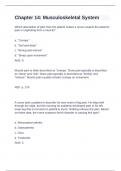-
1. Exam (elaborations) - Aanp leik questions with complete solution
-
2. Exam (elaborations) - Dunphy musculoskeletal question and answers rated a+
-
3. Exam (elaborations) - Adult health exam 2 question and answers already passed
-
4. Exam (elaborations) - Assessing the musculoskeletal system practice questions with complete solution
-
5. Exam (elaborations) - Assessment question and answers rated a+
-
6. Exam (elaborations) - Burns question and answers already passed
-
7. Exam (elaborations) - Ch 16: musculoskeletal disorders question and answers already passed
-
8. Exam (elaborations) - Ch 23: musculoskeletal system question and answers already passed
-
9. Exam (elaborations) - Ch. 45 concepts of care for patients with musculoskeletal problems question and answe...
-
10. Exam (elaborations) - Ch. 68 musculoskeletal disorders question and answers verified to pass
-
11. Exam (elaborations) - Ch. 23: musculoskeletal system (discussion board questions and answers correctly solv...
-
12. Exam (elaborations) - Chapter 12 musculoskeletal disorders question and answers rated a+
-
13. Exam (elaborations) - Chapter 17 question and answers rated a+
-
14. Exam (elaborations) - Chapter 17 question and answers already passed
-
15. Exam (elaborations) - Chapter 17 question and answers verified to pass
-
16. Exam (elaborations) - Chapter 18 questions with complete solution
-
17. Exam (elaborations) - Chapter 22 question and answers rated a+
-
18. Exam (elaborations) - Chapter 24 question and answers 100% correct
-
19. Exam (elaborations) - Chapter 24 question and answers already passed
-
20. Exam (elaborations) - Chapter 39 question and answers verified to pass
-
21. Exam (elaborations) - Chapter 41 question and answers correctly solved
-
22. Exam (elaborations) - Chapter 45 question and answers rated a+
-
23. Exam (elaborations) - Chapter 60 question and answers rated a+
-
24. Exam (elaborations) - Chapter 61 question and answers 100% correct
-
25. Exam (elaborations) - Chapter 61 musculoskeletal assessment question and answers already pass
-
26. Exam (elaborations) - Chapter 61 question and answers verified to pass
-
27. Exam (elaborations) - Chapter 62 musculoskeletal system question and answer verified to pass
-
28. Exam (elaborations) - Eaq with ngn question and answers correctly solved
-
29. Exam (elaborations) - Fitzgerald questions with complete solution
-
30. Exam (elaborations) - Fnp adult musculoskeletal question and answers rated a+
-
31. Exam (elaborations) - Fnp board review questions with complete solution
-
32. Exam (elaborations) - Fnp ii question and answers rated a+
-
33. Exam (elaborations) - Fnp pedi musculoskeletal question and answers 100% correct
-
34. Exam (elaborations) - Fnp review musculoskeletal question and answers already passed
-
35. Exam (elaborations) - Fnp question and answer verified to pass
-
36. Exam (elaborations) - Honan chapter 39 question and answer correctly solved
-
37. Exam (elaborations) - Lewis nclex ch 62 question and answer correctly solved
-
38. Exam (elaborations) - Med surg musculoskeletal questions and answers already passed
-
39. Exam (elaborations) - Med4 question and answers already passed
-
40. Exam (elaborations) - Medical surgical nursing chapter 62 musculoskeletal assessment question and answers r...
-
41. Exam (elaborations) - Medsurg prepu ch 35 assessment of musculoskeletal function question and answers verif...
-
42. Exam (elaborations) - Ms dunphy question and answers correctly solved
-
43. Exam (elaborations) - Msn 620 musculoskeletal module 4 questions with complete solution
-
44. Exam (elaborations) - Musculoskeletal question and answers already passed
-
45. Exam (elaborations) - Musculoskeletal question and answers verified to pass
-
46. Exam (elaborations) - Musculoskeletal disorders practice questions and answers correctly solved
-
47. Exam (elaborations) - Musculoskeletal evolve questions with complete solution
-
48. Exam (elaborations) - Musculoskeletal fnp review fitzgerald question and answers rated a+
-
49. Exam (elaborations) - Musculoskeletal fnp review fitzgerald info question and answers 100% correct
-
50. Exam (elaborations) - Musculoskeletal for np question and answers already passed
-
51. Exam (elaborations) - Musculoskeletal nclex questions with complete solution
-
52. Exam (elaborations) - Musculoskeletal practice questions and answers rated a+
-
53. Exam (elaborations) - Musculoskeletal system question and answers 100% correct
-
54. Exam (elaborations) - Musculoskeletal test bank question and answers already passed
-
55. Exam (elaborations) - Nclex17 question and answers verified to pass
-
56. Exam (elaborations) - Nclex17 question and answers correctly solved
-
57. Exam (elaborations) - Nurs questions with complete solution
-
58. Exam (elaborations) - Nursing musculoskeletal system questions and answers rated a+
-
59. Exam (elaborations) - Patho test 5 review questions and answers 100% correct
-
60. Exam (elaborations) - Pediatric musculoskeletal burns question and answers already passed
-
61. Exam (elaborations) - Pediatric musculoskeletal practice questions and answers verified to pass
-
62. Exam (elaborations) - Pn 3 question and answers correctly solved
-
63. Exam (elaborations) - Prep u chapter 60 question and answers already passed
-
64. Exam (elaborations) - Prep u question and answers already passed
-
65. Exam (elaborations) - Quiz and answers verified to pass
-
66. Exam (elaborations) - Test bank question and answers correctly solved
-
67. Exam (elaborations) - The musculoskeletal system question and answers correctly solved
-
68. Exam (elaborations) - Unit 5 questions with complete solution
-
69. Exam (elaborations) - Week 5 musculoskeletal question and answers rated a+
-
Show more




